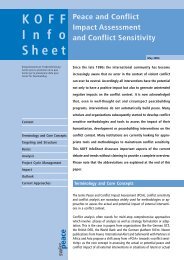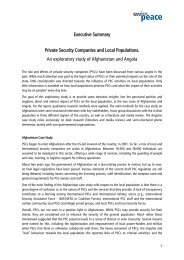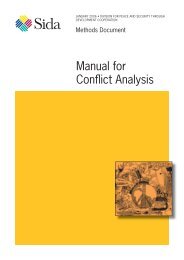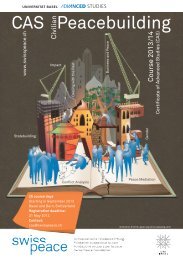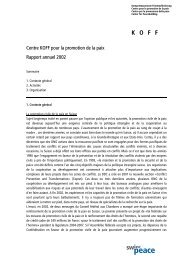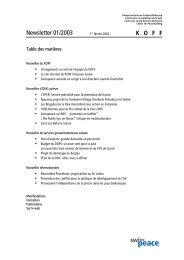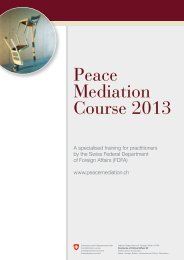Unpacking the Mystery of Mediation in African Peace ... - Swisspeace
Unpacking the Mystery of Mediation in African Peace ... - Swisspeace
Unpacking the Mystery of Mediation in African Peace ... - Swisspeace
Create successful ePaper yourself
Turn your PDF publications into a flip-book with our unique Google optimized e-Paper software.
<strong>Unpack<strong>in</strong>g</strong> <strong>the</strong> <strong>Mystery</strong> <strong>of</strong> <strong>Mediation</strong> <strong>in</strong> <strong>African</strong> <strong>Peace</strong> Processes<br />
North-Mali and North-Niger, Libya<br />
Engagement<br />
By Annika Åberg, <strong>Mediation</strong> Support Project, Center for Security Studies, ETH Zurich<br />
In a Nutshell<br />
The Tuareg are a nomadic pastoralist ethnic<br />
group resid<strong>in</strong>g <strong>in</strong> several West <strong>African</strong> countries.<br />
Dur<strong>in</strong>g <strong>the</strong> 1990s, conflicts emerged between <strong>the</strong><br />
Tuareg and <strong>the</strong> Malian as well as <strong>the</strong> Nigerien<br />
governments, as <strong>the</strong> Tuareg demanded more<br />
autonomy, participation <strong>in</strong> <strong>the</strong> political process,<br />
and economic development <strong>of</strong> <strong>the</strong> countries. In<br />
July 2006, Algerian mediation efforts led to an<br />
agreement between <strong>the</strong> government <strong>of</strong> Mali and<br />
<strong>the</strong> rebel group Democratic Alliance for Change<br />
(DAC), which was rejected by one faction led by<br />
Ibrahim Ag Bahanga. The Niger government refused<br />
altoge<strong>the</strong>r to talk to <strong>the</strong> Tuareg movement<br />
on its side <strong>of</strong> <strong>the</strong> border, <strong>the</strong> Mouvement des Nigeriens<br />
pour la Justice (MNJ).<br />
Libyan leader Muammar Gaddafi <strong>in</strong>itiated peace<br />
talks between <strong>the</strong> Bahanga faction, <strong>the</strong> DAC, and<br />
<strong>the</strong> Malian government <strong>in</strong> March 2008 through<br />
his Gaddafi International Charity and Development<br />
Foundation and through <strong>the</strong> Popular and<br />
Social League <strong>of</strong> <strong>the</strong> Great Sahara Tribes, which<br />
comprises traditional and religious leaders from<br />
21 <strong>African</strong> and Asian countries. The Nigerien<br />
government still refused to talk to <strong>the</strong> MNJ.<br />
In a first phase, talks were held <strong>in</strong> Tripoli on 26<br />
and 27 March 2008. They ended with a ceasefire<br />
agreement. However, this agreement could not<br />
prevent <strong>the</strong> parties from cont<strong>in</strong>u<strong>in</strong>g fight<strong>in</strong>g dur<strong>in</strong>g<br />
<strong>the</strong> subsequent weeks. In a second phase, a<br />
delegation <strong>of</strong> tribal chiefs from 14 <strong>African</strong> and<br />
Asian countries was sent by <strong>the</strong> Popular and Social<br />
League to contact all parties <strong>in</strong> Mali and Niger<br />
to conv<strong>in</strong>ce <strong>the</strong>m to jo<strong>in</strong> <strong>the</strong> peace <strong>in</strong>itiative.<br />
Although all parties <strong>the</strong>reafter pledged to participate<br />
<strong>in</strong> a new round <strong>of</strong> talks, <strong>the</strong>re were no signs<br />
<strong>of</strong> an abatement <strong>of</strong> <strong>the</strong> conflict. On <strong>the</strong> contrary,<br />
<strong>the</strong> Malian government changed its ra<strong>the</strong>r conciliatory<br />
policy after a series <strong>of</strong> deadly attacks by<br />
<strong>the</strong> Bahanga faction. The Libyan <strong>in</strong>itiative must<br />
<strong>the</strong>refore be characterized as a failure, as it could<br />
not provide any substantial contribution to a<br />
54<br />
transition <strong>of</strong> <strong>the</strong> conflict. Although Gaddafi’s approach,<br />
<strong>in</strong>clud<strong>in</strong>g a variety <strong>of</strong> traditional actors<br />
and prom<strong>in</strong>ent personalities, seemed to dist<strong>in</strong>guish<br />
itself from o<strong>the</strong>r Libyan mediation attempts<br />
(e.g., <strong>in</strong> Chad), it failed due to a lack <strong>of</strong> commitment<br />
to <strong>the</strong> signed agreement from all sides.<br />
Key Messages<br />
Implementation mechanisms are crucial: The ceasefire<br />
agreement did not <strong>in</strong>clude clear and realistic<br />
timeframes and implementation mechanisms to<br />
assure that agreed-upon promises were delivered.<br />
Agreement vs. post-agreement commitment: Sticks<br />
and carrots dur<strong>in</strong>g <strong>the</strong> negotiations helped to<br />
achieve an agreement, but could not assure <strong>the</strong><br />
parties’ commitment to adhere to its provisions.<br />
Regional conflicts require regional approaches: The<br />
transnational character <strong>of</strong> <strong>the</strong> Tuareg community<br />
would have made it necessary to coord<strong>in</strong>ate <strong>the</strong><br />
actions and responses <strong>of</strong> all states concerned <strong>in</strong><br />
order to prevent spill-over <strong>of</strong> conflict. Niger’s refusal<br />
to engage <strong>in</strong> <strong>the</strong> process was certa<strong>in</strong>ly an obstacle<br />
<strong>in</strong> <strong>the</strong> peace process.<br />
Political agenda <strong>of</strong> <strong>the</strong> mediator can be problematic:<br />
It can be detrimental for a last<strong>in</strong>g peace process if<br />
mediators are pursu<strong>in</strong>g a political agenda <strong>of</strong> <strong>the</strong>ir<br />
own <strong>in</strong> a conflict (<strong>in</strong> <strong>the</strong> case <strong>of</strong> Gaddafi, <strong>the</strong> Pan-<br />
Arabic discourse), because <strong>the</strong>n <strong>the</strong> mediator does<br />
not focus on facilitat<strong>in</strong>g a solution that is <strong>in</strong> <strong>the</strong><br />
<strong>in</strong>terests <strong>of</strong> all <strong>the</strong> parties to <strong>the</strong> conflict.<br />
Difficulties <strong>of</strong> f<strong>in</strong>ancial <strong>in</strong>centives: High f<strong>in</strong>ancial<br />
<strong>in</strong>centives for agree<strong>in</strong>g to a peace accord can<br />
br<strong>in</strong>g <strong>the</strong> parties to agree to a ceasefire although<br />
<strong>the</strong>y never had <strong>the</strong> <strong>in</strong>tention to respect it.






